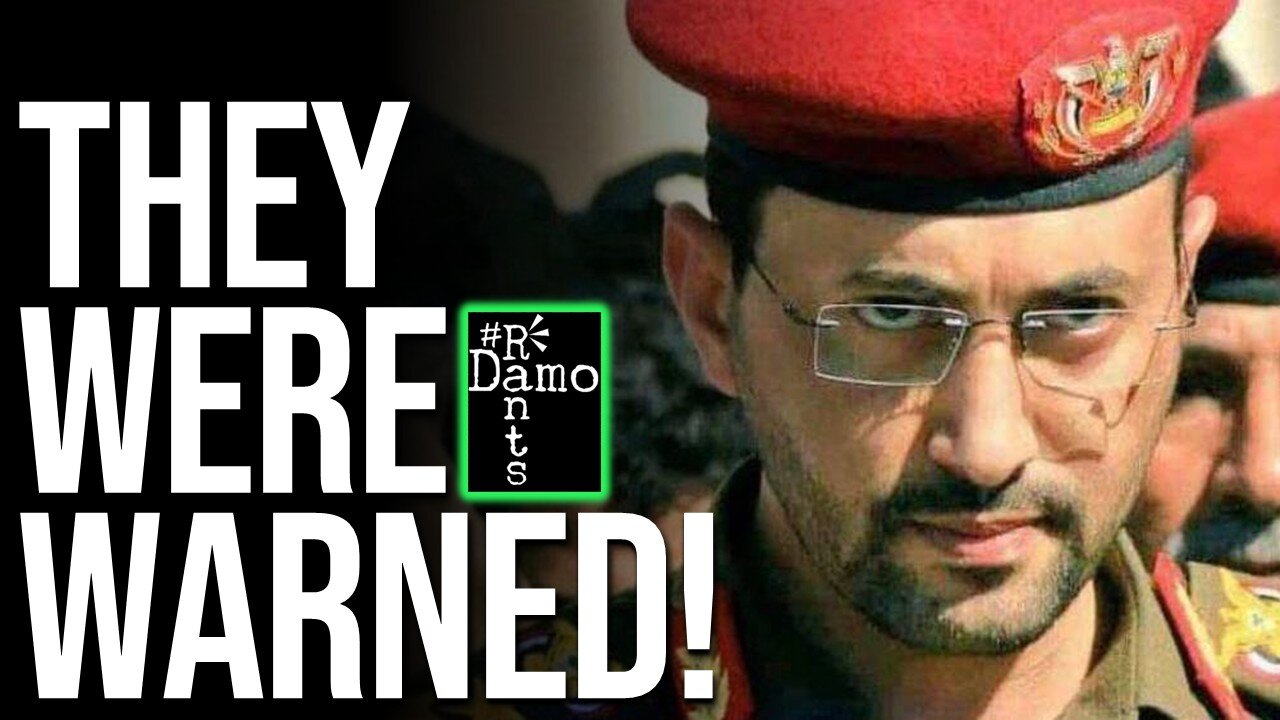Premium Only Content

Netanyahu Wanted More War—So The Houthis Made Him Pay For It
Right, so once upon a time, Israel fancied itself the sole master of Middle Eastern skies—unassailable, omnipotent, a military titan whose enemies trembled at the mere rumble of its jets. But that fairy tale is having a bit of a Brothers Grimm ending, because into the story entered the Houthis: a resistance movement from the mountains of Yemen who, with little more than ingenuity, ideology, possibly some Iranian blueprints, have managed to do what no Arab state has done in decades—hit Israel where it hurts and walk away stronger. They didn’t just disrupt Red Sea shipping or inconvenience a few diplomats. They bankrupted and shut down a major port, pierced the myth of the Iron Dome, and turned Ben Gurion Airport into a panic zone.
Now, as Israel fumes and prepares yet another “major offensive,” the Houthis aren’t blinking. In fact, they’re taking it as a challenge—and now saying they’re going to escalate themselves. Because in this war of drones and deterrence, the Houthis have won out time after time no matter what Israel has done, so why should we believe this time will be any different?
Right, so Israel's threat of a "major offensive" against Yemen the other day, as reported by Channel 14, was delivered with typical bravado. The Israeli military, we were told, had prepared a comprehensive campaign against the Houthis and was simply waiting for political authorisation to begin. The tone was designed to project power. But in the context of recent developments, especially when it comes to the Houthis, it all sounded a bit hollow. Far from retreating or expressing concern, because when do they ever do that, the Houthis have immediately declared a new phase of escalation against Israel, launching missiles toward Be'er Sheva, renewing threats against Ben Gurion Airport, and deepening their maritime campaign in the Red Sea. Israel's rhetoric, far from intimidating, served instead as a provocation the Houthis were more than happy to rise to the challenge of.
The beginning of Israel's unravelling in its confrontations with the Houthis can be traced back yes, to the beginning of the genocide in Gaza in 2023, but specific to Yemen it is more in light of its failure to secure the Red Sea, likely borne out of arrogance and that feeling of invincibility Israel has, along with geography seemingly working against them at every turn as well. What started as a symbolic Houthi campaign in solidarity with Gaza in late 2023 soon transformed into a sophisticated maritime blockade of course. The Houthis, operating from the western coast of Yemen, successfully disrupted international shipping through the Bab el-Mandeb Strait, targeting vessels with ties to Israeli ports and corporations. And over time as we’ve seen, major global shipping firms, including Maersk and MSC, began rerouting away from Israeli waters.
The most significant casualty of this blockade has been the Israeli port of Eilat. By the middle of this month, such had been the effectiveness of the Houthis shutting down of pro Israel Red Sea shipping, that the port was officially closed. They bankrupted it. Press TV reported that the Israeli authorities cited financial insolvency and lack of commercial viability as reasons, but multiple investigations, including those by Al Mayadeen and The Cradle, confirmed that the closure was the result of sustained Houthi pressure. Israel could no longer guarantee the security of Eilat, either for cargo ships or for port workers. It was reported that Eilat, once envisioned as Israel's vital trading hub connecting Africa and Asia, had become functionally obsolete under the weight of Yemeni missile and drone threats. The psychological impact of this loss is massive. For a state that claims to embody military superiority and regional invulnerability, the effective abandonment of one of its own ports, its only Red Sea port, due to pressure from a non-state actor was a moment of profound humiliation.
What turned the conflict from a regional nuisance into a national crisis for Israel was the Houthis' ability to strike deep into Israeli territory, which followed those early Red Sea blockades. The numerous attacks on Ben Gurion International Airport, especially the strike on May 4, marked a turning point. A long-range missile launched from Yemen reached the vicinity of Israel's primary civilian and economic artery, wounding several and causing significant disruption to air traffic. The symbolism of this attack was as significant as its tactical impact. For decades, Israel had cultivated an aura of invulnerability. To see that shattered by a Yemeni resistance movement challenged not only military doctrine but national psychology too. That only worsened dramatically as Iran showed Israel just how little their air defences could stand up to a proper sustained attack.
Following this, earlier this month, the Houthis escalated further by striking near Be'er Sheva, home to Israel's key defence industry installations and research parks, an area Iran itself targeted last month. Press TV detailed how a ballistic missile landed near Israel's tech corridor, signalling that no part of the Israeli south was off-limits. Furthermore, the Negev Air Base, one of Israel's critical military installations, came under fire. The attacks on these targets were deliberate, calculated operations that demonstrated the Houthis' evolving strategic capabilities and intelligence accuracy.
These attacks formed part of a broader campaign the Houthis have called their "fourth phase" of resistance. Spokesman Yahya Saree emphasised that each new Israeli aggression would be met with deeper and more destructive retaliations and given how far the Houthis have come in the 20 months they have been striking Israeli targets in solidarity with Gaza, you do not dismiss such claims out of hand. The Houthis also made it clear that their operations were no longer limited to Israeli state assets. They would now target companies, supply chains, and foreign entities doing business with Israel, expanding the theatre of conflict from military zones to the global economic domain. There’s a BDS element to their attacks now you might say.
These announcements all come in response to these Israeli announcements that they was preparing a new military operation, but for all its dramatic presentation, the announcement has been met with indifference or outright mockery, because Israel gets its backside handed to it by the Houthis every single time. The damage Israel haws caused in Yemen in their strikes has caused damage, and loss of life, but has failed to have any discernible impact on Houthis operations, they have simply targeted civilian infrastructure, resulting in far too many civilian casualties and have been rightfully slammed for this globally.
Israel has already attempted a similar strategy with US help and it didn’t work, so why should we believe acting on their own now can possibly make a difference? During the US-led Operation Rough Rider campaign, which included hundreds of joint air and naval strikes on Yemeni infrastructure, a comprehensive effort to destroy Houthi missile launch sites, drone production facilities, and radar systems, it failed to do so. The results were negligible. The Houthis not only survived, they adapted. Their weapons systems became more mobile, their strikes more frequent, and their communications more resilient. They were on the verge of taking out F-35’s at which point Trump decided to pack up his toys and go home.
Israel’s belief that it could now succeed unilaterally, after failing in coalition with arguably the most powerful military on the planet, reveals a deep misreading of both military reality and Houthi resolve. Indeed, the latest threats have only encouraged further escalation. Just yesterday the Houthis announced a new wave of strikes aimed at Israeli targets, specifically citing Israel's recent airstrikes on Hodeidah port again as a justification. Their response is not just reactive; it is strategic, leveraging Israeli aggression to gain regional legitimacy and moral authority more widely.
The failures in Yemen are not isolated. They reflect a broader structural collapse in Israel’s deterrence framework. For decades, Israeli security doctrine relied on two core assumptions: first, that Israel could strike any target across the region with impunity, they would always be protected by the West; and second, that no adversary could project force into Israel’s core territory. The Houthis have upended both assumptions.
The strikes on Eilat, Ben Gurion, and Be'er Sheva reveal that Israeli missile defence systems, are nothing like as good as they have always been claimed to be. Moreover, the Houthis’ use of drone swarms and redundant targeting systems alongside their missile strikes have overwhelmed Israeli defences at key moments.
Even more damning is the psychological effect. The Israeli public, long accustomed to viewing threats as external and containable, now face the reality that resistance movements thousands of kilometres away can disrupt daily life, disable ports, and strike sensitive military installations. They are not as immune from their government’s insane warmongering ways as they thought they were. The myth of Israeli invincibility, cultivated since the Six-Day War and reinforced by decades of air superiority, is now cracking.
The Houthis’ success also underscores their increasingly central role within the broader Axis of Resistance, that geopolitical coalition that includes Iran, Hezbollah and Iraqi Popular Mobilization Forces. While early Western analyses dismissed the Houthis as merely Iranian proxies, recent evidence suggests a more nuanced reality. Yemen’s resistance movement operates with ideological independence, strategic depth, and a growing capacity for regional influence.
Their alignment with Palestinian liberation is not a matter of expediency but of political identity. When Houthi spokesman Yahya Saree called on Arab nations to defend Gaza "if not for faith, then for shame," he was not merely issuing a rhetorical flourish. He was asserting a pan-Arab, anti-imperialist framework in which Yemen, long seen as peripheral, now stands at the vanguard of..
Israel, by opening a new front in Yemen, has not isolated the Houthis. It has catalysed a confrontation that it is increasingly ill-equipped to manage and if it wants to keep trying it on, they’ll only carry on being humiliated by it.
Beyond strategy, Israel's war on Yemen raises grave legal and ethical questions. Under international law, Israel’s repeated strikes on Houthi-held civilian infrastructure, including ports and industrial areas, constitute violations of the Geneva Conventions, not that Israel ever seems to care about that. The multiple instances in which Israeli airstrikes on Hodeidah caused civilian casualties and damage to water and food distribution systems are all evidence for a case against them. These attacks, justified under the pretext of national defence, increasingly resemble collective punishment—a violation of Article 33 of the Fourth Geneva Convention.
Moreover, the absence of any formal declaration of war, combined with the extraterritorial nature of the strikes, places Israel in breach of the UN Charter, which prohibits aggressive military actions absent Security Council authorisation or self-defence against an imminent threat. Yemen, in contrast, maintains that its strikes on Israel are retaliatory and proportionate responses to both the genocide in Gaza and direct Israeli aggression on Yemeni soil.
Legal advocacy groups have begun filing preliminary evidence with the International Criminal Court, and civil society movements across Europe are demanding that the Israeli military be held accountable not just for war crimes in Palestine, but also in Yemen.
Israel’s campaign against the Houthis has failed—militarily, politically, and morally. It has failed to suppress Houthi missile capabilities. It has failed to protect its own ports, airports, and military installations. It has failed to maintain regional deterrence. And it has failed to justify its actions in the court of international opinion. In contrast, the Houthis have demonstrated resilience, innovation, and a strategic discipline that has earned them respect far beyond Yemen.
The question now is not whether Israel will escalate further, but whether it can afford to. Every new strike invites retaliation. Their economy is on its knees. Every new threat reveals impotence. Every new front in this widening war undermines the very idea of Israeli security.
In attempting to destroy the Houthis, Israel has only strengthened them. In trying to silence resistance, it has given it a louder voice. And in believing it could wage war without consequence, it has brought the war home and the Israeli people know it.
Speaking of BDS though, it isn’t just coming militarily via the Houthis or economically and financially as people choose to not shop Israeli, or illegal settlement as the case may be, but also in educational settings and this is particularly damaging, because if the smartest people are turning away, if Universities worldwide are divesting, then that strikes to the heart of Israel’s legitimacy and justification in what it is doing, it bypasses media narratives, it has people questioning who is telling the truth, because nobody withdraws money or from research partnerships over nothing after all do they? Get all the details of that story in this video recommendation here as your suggested next watch.
Please do also hit like, share and subscribe if you haven’t done so already so as to ensure you don’t miss out on all new daily content as well as spreading the word and helping to support the channel at the same time which is very much appreciated, holding power to account for ordinary working class people and I will hopefully catch you on the next vid. Cheers folks.
-
 4:25:06
4:25:06
Right Side Broadcasting Network
5 hours agoLIVE REPLAY: President Trump Participates in Bilateral Meetings in NYC - 9/23/25
55.2K11 -

Barry Cunningham
3 hours agoPRESIDENT TRUMP HOLDS MEETINGS AT THE UNITED NATIONS!
28.3K8 -
 LIVE
LIVE
StoneMountain64
2 hours agoHitting Max lvl in Arena Breakout Infinite
127 watching -
 21:43
21:43
Scammer Payback
1 hour agoScammers Panic After Massive Virus Attack
4.34K5 -
 LIVE
LIVE
SportsPicks
4 hours agoCrick's Corner: Episode 86
60 watching -
 1:31:17
1:31:17
Russell Brand
3 hours agoIs America Ready for a True Revival? - SF638
169K18 -
 27:42
27:42
Brownells, Inc.
4 hours agoBuilding an 8.6 Blackout AR
8.56K2 -
 30:24
30:24
ROSE UNPLUGGED
1 day agoWhen the Pulpits are Silent
7.36K -
 1:58:02
1:58:02
The Charlie Kirk Show
3 hours agoAllie Beth Stuckey on the Charlie Kirk Revival | Kirk Cameron | 9.23.2025
108K26 -
 LIVE
LIVE
Badlands Media
14 hours agoGeopolitics with Ghost Ep. 41
1,130 watching